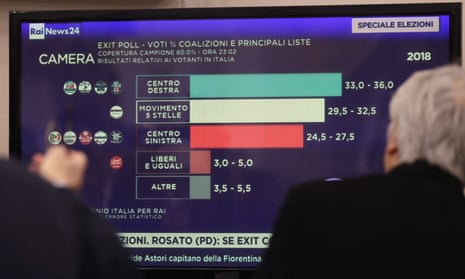Here is Stephanie Kirchgaessner’s latest news round-up of the results.
With the counting and then horse trading likely to take some time, we’re going to wrap up our blog. Thanks for reading.
Catch up with the news and reaction from Sunday’s election
Latest news: Italy issues warning to Europe as poll points to hung parliament

Here is Stephanie Kirchgaessner’s latest news round-up of the results.
With the counting and then horse trading likely to take some time, we’re going to wrap up our blog. Thanks for reading.
Better than expected results for Eurosceptic parties in Italy have been welcomed Britain’s anti European party Ukip.
The election in Italy just adds more weight that the EU project is not working. But we all know what the EU's response will be, don't we? 'More Europe'.
— UKIP (@UKIP) March 5, 2018
The Economist Intelligence Unit has six key points from the result:
Europe Elects charts the dramatic slump in the vote for the centre-left Democratic Party headed by former PM Matteo Renzi. Its share fell from more than 40% in 2014 to just 19%. Many of its former supporters either didn’t vote or switched to the Five Star movement.
Italy, General Election:
— Europe Elects (@EuropeElects) March 5, 2018
PD-S&D in voters (19.0%) compared to 2014 (40.8%):
50.2% voted for PD again
15.6% didn't vote
34.2% voted for other parties:
M5S-EFDD (16.8%)
+E-* (3.4%)
LN-ENF+FI-EPP+FdI-*+NcI-* (8.4%) LeU-S&D (4%)#Elezioni4Marzo2018#ItalyElection2018 pic.twitter.com/CBIIHTUfw7
Former foreign minister, Emma Bonino, now leader of the More Europe party has won a Rome seat in the chamber of deputies, but nationally her party looks set to fall below the 3% threshold necessary for representation in the Senate.
#ItalyElections2018: @piu_Europa leader Emma Bonino elected in Rome.
— David Carretta (@davcarretta) March 5, 2018
It appears that Emma Bonino may not have reached the 3% threshold for her own parliamentary group. It was not a night for "More Europe"
— Stephanie Kirchgaessner (@skirchy) March 5, 2018
Here are the latest projections in the 315-seat Senate and 630-seat Chamber of Deputies.
🇬🇧🇺🇸 New seats projection, Senate (315 seats):
— YouTrend (@you_trend) March 5, 2018
5 Star Movement 115 seats
League 56
Democratic Party 50
Forza Italia 53
Brother of Italy 20
LeU (left) 8
Oth. Cen-left 4
Oth. Cen-right 3#ItalyElection#MaratonaYouTrend
Interior minister Marco Minniti, from the centre-left Democratic Party, has lost his seat to the Five Star Movement.
#elezioni2018 Solo terzo a Pesaro Marco Minniti: il Ministro dell'Interno battuto da Andrea Cecconi, "espulso" M5S → https://t.co/KuvR4sTqNx pic.twitter.com/IwQ5ZbIqZ2
— Rainews (@RaiNews) March 5, 2018
#ItalyElection2018: Interior Minister Marco Minniti has lost his past-the-post race.
— David Carretta (@davcarretta) March 5, 2018
Early results show a win for Boschi in her native (oh no, not native) South Tyrol, while Minniti, the interior minister who orchestrated a controversial deal with Libya, lost.
— Stephanie Kirchgaessner (@skirchy) March 5, 2018

The Italian stock market has fallen in early trading as traders fret that Italy faces a period of political instability.
The benchmark FTSE MIB index tumbled by 2% at the open. It then stabilised around 1% lower, so there’s no sign of actual panic.
Unicredit, Italy’s largest bank, has shed 2.5% while UBI Banca are down 3.8%.
Rebecca O’Keeffe, Head of Investment at interactive investor, says the markets are nervous.
“Italy looks to have taken a step to the right and moved towards populism and change.
The complexity of the Italian voting system makes it very difficult to establish what happens next and when, but neither of the anti-establishment Five star movement or League parties are an attractive option for markets or the euro.”
Shares in Silvio Berlusconi’s Mediaset company have fallen by over 4% after his Forza Italia party did worse than expected in Sunday’s election, lagging behind the Northern League. Mediaset has been fighting a long legal battle with France’s Vivendi, and a strong showing by Forza Italia would have strengthened its hand.
See Business Live for more on the economic fallout from the election.
The Italian election results have prompted a fall on the euro. It hit a six-month low versus against the yen after stronger than expected results for results euro-sceptic parties, Reuters reports.
The euro zone’s third biggest economy now faces a prolonged period of political instability after voters delivered a hung parliament, spurning traditional parties and flocking to anti-establishment and far-right groups in record numbers.
The euro fell 0.3% and was traded at $1.2282, edging towards its seven-week low of $1.21545, which it touched on Thursday. Against the yen it fell to 129.35 yen, its lowest level since late August.
Although no party won a majority, the anti-establishment 5-Star Movement came out as a clear winner, looking set to become the largest single party by a wide margin.
The centre-right bloc, made up of former prime minister Silvio Berlusconi’s Forza Italia, and the far-right League and Brothers of Italy, is set to win most seats but is seen falling some way short of an absolute majority.
But in a bitter personal defeat for the billionaire media magnate, his Forza Italia party was overtaken by its ally, the far-right, anti-immigrant League.
Investors are likely to take fright at any suggestion the 5-Star could form a coalition with the right-wing League.
Initial tallies suggested the two forces would have enough seats to govern together and they have in the past shared strong anti-euro views. While the League still says it wants to leave the single currency at the earliest feasible moment, the 5-Star says the time for quitting the euro has passed.
“(The euro) gained in early Asian trade, perhaps due to the German vote, but then started turning down as the results from Italy began coming in. I’d expect it to weaken further today as the market absorbs the results of the Italian election,” said Marshall Gittler, chief strategist at ACLS Global.
RT BloombergTV "There may be a few direction changes yet for the euro, but the initial negativity has worn off as investors digest the implications of the Italian exit polls and projections https://t.co/k5tshPpjOA #ItalyElection2018 pic.twitter.com/wEel0pthB5"
— TopFiveTraders (@TopFiveTraders) March 5, 2018
This was an anti-establishment triumph on a par with Brexit and Trump, according to Bloomberg and Reppublica columnist Ferdinando Guigliano.
He shares his thoughts over a large moka.
Good morning all from Rome - as you can see I have opted for the large moka pot this morning. We will all need it! Here are a few thoughts on #Italianelections2018 after an extraordinary night. pic.twitter.com/PkLvtN5iTH
— Ferdinando Giugliano (@FerdiGiugliano) March 5, 2018
2. Let's start with the electoral arithmetics. It's ugly. None of the three blocs (Centre-right, Centre-left, 5 Star Movement) will be able to secure a majority. We will need some form of grand coalition, which, in a way is what we always expected.
— Ferdinando Giugliano (@FerdiGiugliano) March 5, 2018
4. These calculations should not distract us from the main political message of #ItalyElection2018 - this was an anti-establishment triumph, of the same league as the #Brexit or the #Trump upsets, in the eurozone's 3rd largest country.
— Ferdinando Giugliano (@FerdiGiugliano) March 5, 2018
5. More than half of the voters have backed the Five Star Movement and the League. These parties have been very cautious (to say the least) on the euro, critical of Italy's migration policy, and open to "no vax" ideas.
— Ferdinando Giugliano (@FerdiGiugliano) March 5, 2018
7. This new political reality will not go away by calling a new election or by some coalition wizardry.The 5 Star Movement has been excluded from power for years, but has kept growing.The League is in a dominant position in the centre-right. Like it or not, this is the new Italy.
— Ferdinando Giugliano (@FerdiGiugliano) March 5, 2018
8. The League and the 5 Star Movement will be rightly celebrating today. But the hard part starts now. They have triumphed on a fanciful platform of unrealistic promises (flat tax, universal basic income). If they go into government, they are bound to disappoint.
— Ferdinando Giugliano (@FerdiGiugliano) March 5, 2018
9. What happens when reality starts to bite? Will anti-establishment parties turn against the EU, or will they renege on their promises because leaving the euro is too dangerous? It's far too early to tell, but I guess we are about to find out. #Italianelections2018
— Ferdinando Giugliano (@FerdiGiugliano) March 5, 2018